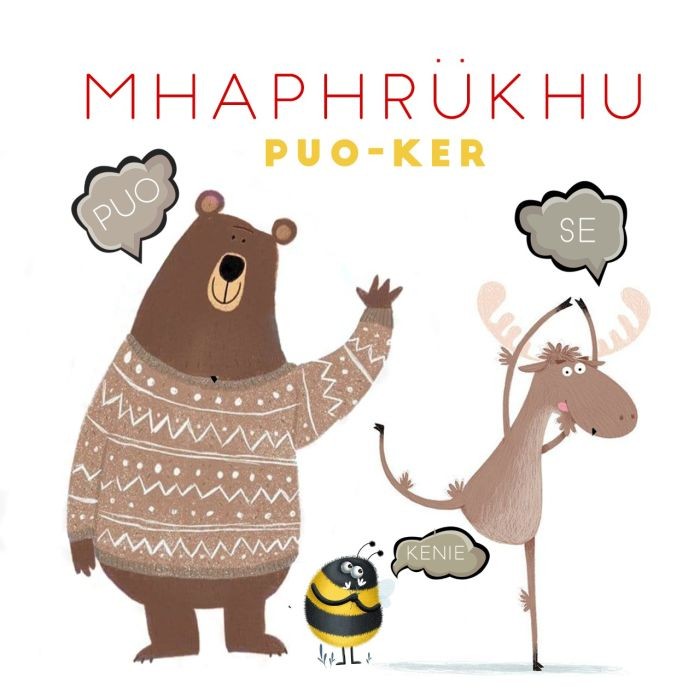
Vishü Rita Krocha
Kohima | February 20
Like most people of today’s generation, Mechüni Whiso Iralu grew up speaking English with her siblings. “Eventually, we got rather too comfortable with it and stopped using our dialect. Trouble began when we started having visitors who couldn’t speak English”, she says while recalling how people would come looking for her parents speaking in Tenyidie.
Out of sheer embarrassment, she relates, “I would reply with “ule/uho” (referring to ‘yes’ in Tenyidie) even when I had no clue what the guest said.” She recollects how it got worse when she began attending youth service in her church and understood nothing. “At social gatherings, when people around me would be laughing to a joke, I’d be sitting there with a forced grin pretending to know what was going on,” she shares.
Today, Mechüni Whiso Iralu, who has a daughter, shares, “I look at her and I know I don’t want her to face what I did.”
This is when she conceived the idea to develop ‘Mhaphrükhu’, a children’s book about numbers, covering numerals 1-10 in Tenyidie, also including names of animals and insects in each leaf.
“In a time when the influence of foreign cultures is fast overshadowing the need to maintain our cultural identity, this book has been developed with the aim to encourage both toddlers and parents to take a step towards preserving one’s native linguistic proficiency”, she said.
This year’s theme for International Mother Language Day— ‘Fostering multilingualism for inclusion in education and society’ also highlights that “education, based on the first language or mother tongue, must begin from the early years as early childhood care and education is the foundation of learning.”
An initiative of Bangladesh, International Mother Language Day was approved by UNESCO in 1999 and is observed throughout the world every year on February 21 since 2000.
Mechüni Whiso Iralu also notes that Naga dialects fall under the category of tonal languages. “In Tenyidie, certain words may carry as many as fifteen different meanings. The word ‘khru’ has fifteen meanings in the Angami-Tenyidie dictionary.
We employ the pitch to distinguish its lexical or grammatical meaning and inflect words. When a word or an utterance is transcribed phonetically, it gives direct specification of its pronunciation”, she explains.
It is her hope that the ‘tiny’ step that she has taken in the form of ‘Mhaphrükhu’ would go a long way in enabling parents to influence their little ones to learn in their mother language. Mechüni Whiso Iralu has an M.A. degree in English Literature from JNU New Delhi and BEd, from The English and Foreign Language University, Hyderabad respectively.
‘Languages are disappearing’
It is estimated that one language dies every two weeks. In the words of Yirmiyan Arthur Yhome, Photo Editor at Associated Press, ‘one certainly needs no reminder on how languages are disappearing’. She feels that “we are losing out so much in the process of trying to ‘fit in’,” because in the end that’s largely why we embrace new languages, new cultures.”
Unfortunately, she points out, “We fail to see what we lose while putting sight on what we want to gain.”
Highlighting that “members of the Navajo nation were trying to desperately keep their elders safe from the coronavirus pandemic because some of them are the last links to the wisdom of a generation”, she expresses hope that “Nagas are able to recognize this threat and begin advocating the richness of our own language and culture.”
“If we don’t start with our own children, it will be a lost battle,” she asserts.
“Let’s make it cool to be multi-lingual and speak Tenyidie or Tangkhul (which is my mother tongue) or Sümi, while also holding secret dreams to publish a novel in the Queen’s language someday”, she urges.
For Research Associate, Thebi Joseph Shupao, even a song sung in one’s own mother tongue sounds sweeter and deeper. “Language connects people”, he remarks while pointing out that “even if you meet a stranger in a foreign land, if you speak the same language, you connect automatically.”
“We must strive towards preserving our mother language and pass it on to our children early on”, he shares.






